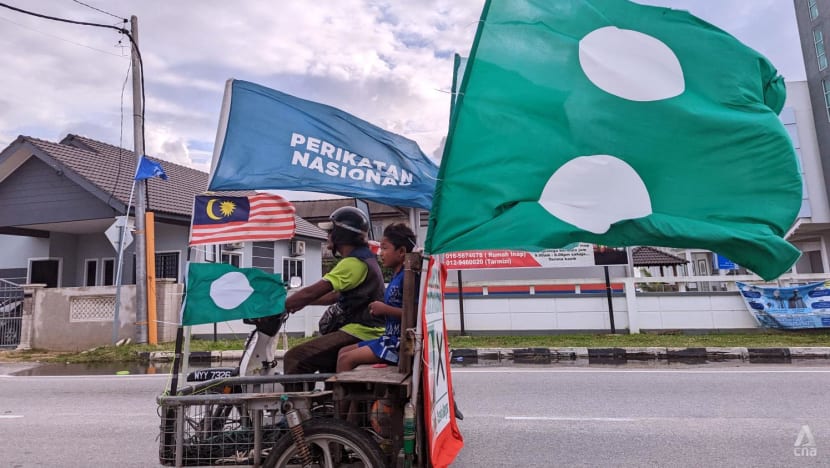Parti Islam Se-Malaysia’s rise in GE15: Is Malaysia becoming more conservative?
While some analysts have said that this shows a moving tide in Malaysian politics towards Islamism, other observers have taken a softer stance, pointing to other underlying issues.

A man riding his motorcycle affixed with the Parti Islam Se-Malaysia flag in Terengganu. (Photo: CNA/Try Sutrisno Foo)
SINGAPORE: The quiet rise of Malaysia’s Islamic party in the 15th general election has left non-Muslims and non-Malays in Malaysia concerned about the country potentially heading in a more conservative direction.
While some analysts said that support for Parti Islam Se-Malaysia (PAS) and its brand of conservative Islam shows a moving tide in Malaysian politics towards Islamism, other observers have taken a softer stance, pointing to other underlying issues in the country's political landscape.
“I know that the first take and generalisation that people might make is that Malaysia is becoming a lot more conservative Islamic traditional society. (But) one must be more circumspect and careful about the analysis here,” analyst Trica Yeoh told CNA’s Asia First on Monday (Nov 21).
The massive showing by PAS was likely in part due to Malay voters disgruntled with the United Malays National Organisation’s (UMNO) years of infighting, leadership struggles and corruption allegations, said Ms Yeoh, the chief executive officer of the think-tank Institute for Democracy and Economic Affairs (IDEAS).
These issues led to the downfall of UMNO and its Barisan Nasional (BN) coalition, with voters flocking to the party with the next closest set of principles and policies that they could relate to: PAS.
“A large chunk of Malay conservatives could not bring themselves to vote for UMNO in this election. PAS was seen as the non-corrupt, clean alternative with not so much baggage,” Ms Yeoh said.
PAS’ SURPRISING RISE TO POWER
“PAS is the biggest beneficiary of the swing to PN (Perikatan Nasional). Perhaps PAS and PN have created a new space for Malay voters who reject BN, but at the same time (are) not ready for Pakatan Harapan,” said Mr Adib Zalkapli, director of advisory firm BowerGroupAsia.
PAS, a right wing party with a hardline Islamist agenda within the PN coalition, was the biggest winner in Saturday’s general election. It won 49 seats, the most number held by a single party.
Its quiet rise was overshadowed by bickering between the larger, more mainstream parties and coalitions, as well as veteran politicians vying for prime ministership.
The party’s wins in Saturday's contest are more than double the number of seats it captured in the last election, when it clinched 18 seats. It extended its reach beyond its traditional stronghold of the Malay-belt states of Kelantan, Terengganu and Kedah, and made inroads into liberal states like Penang.
PRESENCE IN PARLIAMENT
If PN manages to secure enough support from BN and the Borneo states to form the government, PAS is likely to have a considerable presence in Cabinet, said experts.
PAS’ number of seats, more than double that of the 24 won by PN chairman Muhyiddin Yassin’s Parti Pribumi Bersatu Malaysia (Bersatu), will give the party leverage to secure Cabinet positions for its members.
“There will be a lot of negotiations for Cabinet positions. I would imagine PAS would want a lion's share of Cabinet posts within the new government,” Associate Professor Maznah Mohamad from the National University of Singapore’s department of Southeast Asian studies told CNA’s Asia Tonight on Sunday.
However, PAS’ success will not be enough for its president Abdul Hadi Awang to take a shot at prime ministership, as the party remains divisive for Malaysians due to its ultra-conservative views, said observers.
Mr Muhyiddin, despite Bersatu now being a minority partner in PN, has emerged as the top contender for the top job.
“Muhyiddin is popular because he does this religious fatherly figure very well and that speaks to the Malay base – you’ve got to be this older male who can speak the religious verses, use the right phrases,” said Dr Serina Abdul Rahman, a visiting fellow at ISEAS-Yusof Ishak Institute’s Malaysia Programme and Regional Economic Studies.
YOUNGER MALAYSIANS ARE MORE CONSERVATIVE
PAS’ popularity in this election has also been attributed to the new generation of first-time voters.
Younger Malaysians are likely to be more conservative and religious, and with a large number of new voters – after the polling age was reduced from 21 to 18 – this was likely to have contributed to PAS’ wins, said analysts.
“Among the younger voters that we have seen in the past decade, they are more likely to see themselves as Muslims first, as opposed to Malays first, and then being Malaysians itself a distant third,” Ms Yeoh said.
The pandemic also contributed to a rise in conservative views, observers said.
“The right has emerged out of a time of COVID-19 crisis, with a swing toward ultra-Malay conservative Islamist forces,” said Dr Bridget Welsh, an honorary research associate from the University of Nottingham Asia Research Institute Malaysia.
She added that young voters, who kicked out the incumbent ruling coalition, have led to a resurgence of old political polarisation among racial and religious lines. She warned that this will tear at Malaysia’s social fabric and undercut investments.
Politicking has also made it difficult for other parties, such as the Democratic Action Party (DAP), to gain a foothold among conservative Malays as they have been branded as too liberal and will not uphold – and instead erode – traditional Malay values and Islamic principles.
However, Ms Yeoh cautioned that voters with these views are still on the fringes of extreme conservatives, and should not be a sweeping statement across Malaysia.
“These kinds of polarising trends are unhealthy for a country that is multiracial and multireligious. But I think we do need to be careful about just having these sweeping generalisations,” she said.
“The large majority of Malaysia is still what we would call perhaps traditional, rather than conservative.”


















